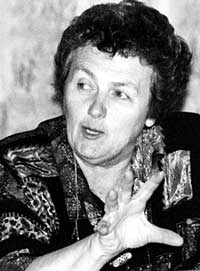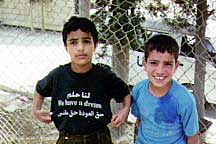News > Joan Chittister: The Price of Victory; the Legacy of Defeat
 The Price of Victory; the Legacy of Defeat
The Price of Victory; the Legacy of Defeat
by Joan Chittister, OSB
from Report from the Peace Council, Fall, 2000
It is relatively easy to maintain order in a country. Any clear amount of force, artfully employed, can do that well. What is difficult is to achieve peace. Any number of places on earth have been well contained while violence simmered just beneath the orderly surface. The trick is to distinguish order from peace one from the other so that one does not cloak the other.
Peace delegations, negotiators, and international cheerleaders of every ilk are deeply involved in the question of land rights in the Middle East, in the political elements of the Palestinian/Israeli peace process, in the diplomatic impasse between Jewish Israel and the Arab States on its borders, the Arab population in its midst. The question is who, if anyone, is attending to the questions that eat away at the underside of victory, that underlie the issues, that make order look like peace, that are secretly, silently shaping the future before the past is really past.
The problem of what price victory is is an historic one, a prevailing one. We can’t say that we haven’t been warned. History is replete with wisdom figures who remarked with pain on defeat and at the same time acknowledged victory with sadness. We have been told over and over again that victory is not always what it may seem, that the problems of war are not over even when the war is over. Winston Churchill was fatefully wry about it: “The problems of victory are more agreeable than the problems of defeat,” Churchill warned the British House of Commons in 1942, “but they are no less difficult.” And John Dryden reflected years before that, “Even victors are by victories undone.” The insights are important: There is a closing cost to be paid for victory, whoever wins the war.
In its recent visit to Israel/Palestine, the Peace Council saw some of them up close.
In an Arab village on the West Bank where Jewish settlers stake their claim to land by squatter’s rights and Arabs are denied the building permits that make construction legal, we sat in the third home of an Arab man whose house had already been demolished twice for building without authorization. His children had been traumatized by the terror of it and his wife had a breakdown as a result. His immediate concerns for them and their future were obvious. His long term anxieties, on the other hand, were prescient. Children in the neighborhood, terrified of the soldiers and frightened of the Jews, had taken to stealing things from the cars of even sympathetic Jewish visitors to the area, he told us. It was the children’s response to fear, to helplessness, to anger.
 What will happen in the future, he mused, to these children of the ‘intifada’ (the youth riots in which Arab children attacked Israeli soldiers with stones).
What will happen in the future, he mused, to these children of the ‘intifada’ (the youth riots in which Arab children attacked Israeli soldiers with stones).
“First they threw rocks at Israeli soldiers,” he said. “Now they throw rocks at Palestinian soldiers—or anyone—and soon they will be throwing rocks at one another because that is what they are learning.”
The first problem of the kind of peace that follows war was clear: How do we raise peaceful children in a violent society and what happens to the fabric of society if we do not?
The second problem was just as present, just as clear. In retaliation for bus bombings by Arab terrorists, Palestinians are routinely denied the work permits that allow them to travel into Jerusalem, to work there, to earn the money they need to feed their children. Israel, in the meantime, hires foreign workers to take the place of resident Palestinian laborers. The social impact is broad and deep. Every conversation of every Palestinian whose movements are restricted, whose freedom is limited, bristles with resentment. The women who could not come into Jerusalem to meet with Peace Council members because they could not get border passes, the men who are forced to sit idle in the refugee camps while imported workers take the work they seek, fan the ashes of an unhappy peace. Israel’s strong security fears are understandable—certainly historically grounded and even just, perhaps—but the legacy of bitterness that flows from this new kind of apartheid promises to put a strain on social relationships here for decades to come, whatever the future legal niceties.
Finally, the population explosion of the Middle East, the urban sprawl that pushes the boundaries of Jerusalem further and further into Bedouin territory, into Muslim neighborhoods, into land long Arab and only newly claimed by Israel, dims the hope for peace. No land will ever be enough land for nations that have not learned to work together as equals to share it and no amount of force will supply what the sense of human community does not.
Social violence, ethnic resentment and national chauvinism are sad by-products of an even sadder history of a region full of long displaced peoples on both sides. To raise children who have learned to hate, and peoples who have learned to mistrust and nations that have learned to use force where collaboration should be instead is to win nothing at all.
?They make a wasteland and call it peace,? the Roman Seneca said.
?It is not the cause for which men took up arms,? philosopher Simone Weil wrote in the aftermath of an unjust peace and the new war it spawned, ?that makes a victory more just or less, it is the order that is established when arms have been laid down.? It is not a peaceful situation that prevails in Israel, in other words, no matter how much order has been imposed by force. And yet the makings of a real nation, a genuine security are already in their midst.
Rabbis for Human Rights—Jewish religious leaders from every stream of Judaism—are working side by side with Arabs to rebuild the demolished homes, to work in the refugee camps, to speak out for Palestinians in the midst of Israel and on its borders.
Israel is a teeming, straining place, a political morass, indeed. But its real anguish lies not so much in its cultural differences as in the genetic irony that underlies them. The day the Peace Council delegation returned from Israel, the New York Times carried an article on the genetic identity of Arabs and Jews. Arabs and Jews are, it seems, the same family however distinct they may see themselves at this time in history. And what is more painful than a family divided?
Rabbis for Human Rights, these carriers of the memory of slavery in Egypt and Exodus in Sinai, are sharp witness to ‘the order that must be established when arms have been laid down.’ It is not the order of control for which they are laying down their own lives. It is the order Jewish scripture calls for between lions and lambs. It is the order of the human family reaffirmed where it is being most contested. It is a reminder to us all, in our own private little wars, that it is the order that is established after we have established order that really determines whether or not we truly have peace.
Home ||
About the Peace Council ||
Peace Councilors ||
Purpose and Commitments ||
Current Annual Report ||
Looking Ahead ||
News ||
Trustees ||
How You Can Help ||
Links ||
Contact ||
Page Published: 04/17/2003 · Page Last Modified: Thursday, December 6, 2007
©2003 International Committee for the Peace Council
